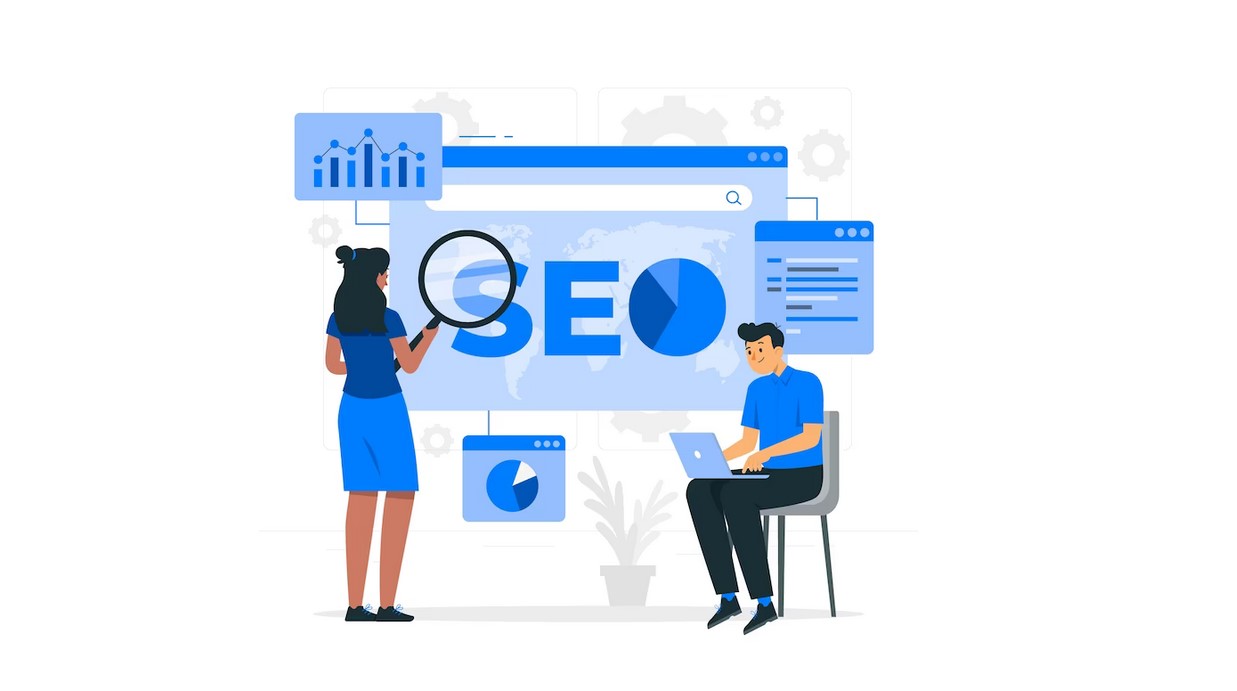SEO stands for Search Engine Optimization. In general terms, SEO refers to the practice of optimizing a website or online content to improve its visibility and ranking in search engine results pages (SERPs). The ultimate goal of SEO is to attract organic (unpaid) traffic to a website by making it more visible to users who are searching for relevant information, products, or services online.
SEO involves various techniques and strategies, both on-page and off-page, to align with search engine algorithms and improve a website’s chances of ranking higher in search results. Some common SEO practices include keyword research and optimization, creating high-quality and valuable content, optimizing website structure and meta tags, obtaining backlinks from reputable sources, ensuring mobile-friendliness, and providing a positive user experience.
By implementing effective SEO practices, websites can increase their organic traffic, reach a targeted audience, and establish themselves as authoritative and trustworthy sources in their respective industries. SEO is an ongoing process, as search engine algorithms and user behavior continually evolve, requiring website owners and marketers to stay updated with the latest trends and best practices to maintain and improve their search engine rankings.
Understanding SEO and Its Fundamentals

SEO (Search Engine Optimization) is a digital marketing strategy aimed at optimizing a website or online content to improve its visibility and ranking in search engine results pages (SERPs). The fundamental goal of SEO is to attract organic (non-paid) traffic from search engines by making the website more relevant and valuable to users.
The key fundamentals of SEO include:
Keyword Research:
Identifying relevant keywords and phrases that users are likely to use when searching for products, services, or information related to a particular business or topic. Keyword research is essential as it forms the basis for optimizing content around those targeted keywords.
On-Page SEO:
On-page SEO involves optimizing various elements directly on the website to improve its search engine rankings. This includes optimizing meta titles, meta descriptions, headers, URL structures, and incorporating targeted keywords naturally into the content.
Content Quality
Creating high-quality, informative, and engaging content is crucial for SEO success. Search engines value fresh, valuable content that addresses user intent and provides answers to their queries.
User Experience
A positive user experience is an essential aspect of SEO. Websites with fast loading times, easy navigation, and mobile responsiveness are favored by both users and search engines.
Backlinks and Off-Page SEO
Off-page SEO focuses on building high-quality backlinks from reputable websites. Backlinks act as “votes” of confidence for a website’s credibility and authority, which positively impacts search engine rankings.
Technical SEO
Technical SEO focuses on optimizing the technical elements of a website to enhance its crawlability and indexability for search engines. By improving these technical aspects, the website becomes more accessible and visible to search engine bots. This includes optimizing robots.txt, XML sitemaps, handling duplicate content, and ensuring proper site architecture.
Local SEO
For businesses with physical locations, local SEO is essential to attract local customers. Optimizing for local searches and managing business listings ensures visibility in local search results.
Analytics and Tracking
Implementing web analytics tools like Google Analytics helps track and measure the performance of SEO efforts. Analyzing data provides insights into user behavior, popular content, and areas for improvement.
Algorithm Updates
Search engines frequently update their algorithms to deliver better user experiences. SEO professionals must stay informed about these updates and adjust their strategies accordingly.
Ethical Practices
Following ethical SEO practices and avoiding black-hat techniques (e.g., keyword stuffing, cloaking, and buying links) is crucial for sustainable SEO success. Ethical practices build trust with search engines and protect the website from potential penalties.
In summary, SEO is a multifaceted approach to enhance a website’s visibility in search engine results. By understanding and implementing the fundamentals of SEO, businesses can attract organic traffic, reach their target audience, and establish themselves as authoritative and trustworthy sources in their industry.
What is The Impact of SEO on Organic Traffic?
SEO (Search Engine Optimization) has a significant impact on organic traffic to a website. Organic traffic refers to the visitors who come to a website through unpaid, non-advertising means, primarily through search engine results. Here are some ways in which SEO affects organic traffic:

Improved Search Engine Rankings:
Properly executed SEO strategies can improve a website’s rankings in search engine results pages (SERPs). When a website appears higher in the search results for relevant keywords, it is more likely to attract clicks and visits from users searching for related information.
Increased Visibility:
SEO helps in making a website more visible to search engines by optimizing its content, structure, and meta tags. Increased visibility means more chances of appearing in relevant searches, leading to higher organic traffic.
Relevant Keyword Targeting:
SEO involves researching and targeting relevant keywords and phrases that users are using to search for information online. By optimizing content around these keywords, a website can attract traffic from users specifically interested in those topics.
Quality Content Creation:
SEO encourages the creation of high-quality, informative, and engaging content. Search engines value fresh, valuable content, and websites that consistently publish such content are likely to gain higher rankings and attract more organic traffic.
Mobile Optimization:
With the increasing use of mobile devices, search engines prioritize mobile-friendly websites in their rankings. A well-optimized mobile website can significantly impact organic traffic, especially since more searches are now conducted on mobile devices.
User Experience:
Search engines take user experience into account when determining rankings. Websites that offer a better user experience, including fast loading times, easy navigation, and relevant content, tend to rank higher and attract more organic traffic.
Backlinks and Authority:
SEO also involves building high-quality backlinks from reputable websites. Search engines consider backlinks as votes of confidence, indicating that a website is a trustworthy and authoritative source. Sites that possess robust backlink profiles often secure higher rankings and attract increased organic traffic.
Local SEO:
For businesses with physical locations, local SEO plays a crucial role in attracting local organic traffic. Optimizing for local searches and appearing in local business directories can lead to increased visibility among local customers.
Long-term Traffic Source:
Unlike paid advertising, which stops driving traffic once the budget runs out, SEO can provide a more sustainable and long-term source of organic traffic. Once a website achieves good rankings, it can continue to attract organic traffic without ongoing expenses.
In conclusion, SEO plays a crucial role in driving organic traffic to a website. By optimizing various aspects of a website and aligning with search engine algorithms, businesses and website owners can benefit from increased visibility, higher rankings, and a steady flow of organic traffic over time.
How SEO as a Cost-Effective Marketing Strategy?
SEO (Search Engine Optimization) is considered a cost-effective marketing strategy for various reasons. It offers several benefits that can lead to significant returns on investment (ROI) when implemented correctly. Here’s a detailed explanation of how SEO proves to be a cost-effective marketing approach:

Organic Traffic and Long-Term Results:
SEO focuses on optimizing a website to rank higher in organic search results. Once a website achieves good rankings for relevant keywords, it can attract a steady stream of organic traffic without the ongoing costs associated with paid advertising. Unlike paid campaigns that stop delivering traffic when the budget is exhausted, SEO provides long-term results, making it a more sustainable and cost-efficient marketing strategy in the long run.
Targeted Audience:
SEO targets users who are actively searching for products, services, or information related to a business’s offerings. By optimizing for relevant keywords, SEO ensures that the website appears in front of a highly targeted audience, increasing the chances of converting visitors into customers. This targeted approach saves money compared to broader, less focused advertising methods.
Cost Savings Over Paid Advertising:
While paid advertising can be effective, it can also be expensive, especially for competitive keywords and industries. SEO eliminates the need for paying per click or impression, making it more affordable for businesses with limited marketing budgets. The cost of SEO is primarily centered around the initial setup and ongoing optimization efforts, making it a cost-effective alternative to paid campaigns.
Improved User Experience:
SEO involves optimizing various elements of a website to enhance user experience, including faster loading times, easy navigation, and mobile responsiveness. A positive user experience not only leads to higher rankings in search engines but also encourages repeat visits and referrals, reducing the need for additional marketing spending to attract new customers.
Brand Credibility and Authority:
Websites that consistently rank high in search results are perceived as more trustworthy and authoritative by users. Implementing SEO helps build a brand’s online presence and credibility without the need for costly brand-building campaigns.
Local SEO for Targeted Local Marketing:
Local SEO strategies help businesses target customers in specific geographic areas. For businesses with physical locations, local SEO can be particularly effective and cost-efficient as it drives foot traffic and phone calls from local consumers actively seeking nearby products or services.
Measurable and Data-Driven:
SEO allows for detailed performance tracking and analysis. Web analytics tools provide valuable insights into user behavior, allowing businesses to measure the effectiveness of their SEO efforts. This data-driven approach enables businesses to make informed decisions and optimize their strategies, maximizing the impact of their marketing budget.
Flexibility and Scalability:
SEO strategies can be adjusted and refined based on performance data and changes in the competitive landscape. This flexibility allows businesses to adapt their approach without incurring significant additional costs. As a business grows, SEO efforts can be scaled up to accommodate increased demand and expand the reach of the marketing efforts without the same linear increase in costs associated with many other marketing channels.
In summary, SEO is a cost-effective marketing strategy that can provide long-term, targeted, and sustainable results. By focusing on organic traffic, optimizing user experience, and leveraging data-driven insights, businesses can achieve higher rankings in search engines, attract a relevant audience, and establish themselves as credible and authoritative sources within their industry, all while minimizing ongoing marketing expenses.
How to Building Credibility and Trust through SEO?
Building credibility and trust through SEO involves various strategies that aim to establish your website as a reliable and authoritative source in your industry. When users trust your website, they are more likely to engage with your content, products, and services. Here are some effective ways to build credibility and trust through SEO:

High-Quality Content:
Create valuable and informative content that addresses the needs and interests of your target audience. Content that demonstrates expertise, solves problems, and offers insights builds trust with readers and encourages them to return to your site for more information.
E-A-T (Expertise, Authoritativeness, Trustworthiness):
Google’s search algorithms increasingly focus on E-A-T. To build credibility, showcase the expertise of your content creators, demonstrate your website’s authority in your niche, and ensure your content is trustworthy by providing accurate information, citing reliable sources, and avoiding misinformation.
User-Friendly Website:
A well-designed, user-friendly website is crucial for establishing trust. Optimize your website’s navigation, ensure fast loading times, and make it mobile-friendly to provide a seamless and positive user experience.
Secure Website:
Implement HTTPS and an SSL certificate to secure your website. A secure connection is not only important for user privacy but also influences search engine rankings, as search engines prioritize secure websites.
Transparency and Contact Information:
Clearly display contact information, including a physical address, email, and phone number, on your website. Being transparent about your company’s identity and location helps build trust with users.
Positive User Reviews and Testimonials:
Encourage customers to leave positive reviews and testimonials on your website or third-party review platforms. Positive feedback from satisfied customers can boost your credibility and provide social proof for potential customers.
Backlinks from High-Quality Sources:
Earn backlinks from reputable and authoritative websites. Quality backlinks signal to search engines that your content is valuable and trustworthy, positively impacting your website’s credibility.
Local SEO for Local Businesses:
If you have a local business, optimize your website for local SEO. This includes creating local business listings, obtaining positive reviews from local customers, and being active in the local community to build credibility within your geographical area.
Regularly Updated Content:
Maintain an active blog or news section on your website, regularly publishing fresh and up-to-date content. Keeping your website current and relevant demonstrates that your business is actively engaged and knowledgeable in your industry.
Avoid Black-Hat SEO Techniques:
Avoid unethical SEO practices, such as keyword stuffing, cloaking, and buying links, as these can harm your website’s credibility and reputation. Instead, focus on providing genuine value to users through your content and SEO efforts.
Engage on Social Media:
Be active on social media platforms, sharing your content and engaging with your audience. A strong social media presence can help you connect with your target audience and reinforce your credibility as a trusted industry expert.
By implementing these strategies, you can enhance your website’s credibility and trustworthiness in the eyes of both users and search engines. Building trust through SEO takes time and effort, but the long-term benefits of a reputable and authoritative online presence are well worth the investment.
Why Local SEO for Brick-and-Mortar Businesses?
Local SEO is essential for brick-and-mortar businesses because it helps them attract local customers and increase foot traffic to their physical locations. Unlike online businesses that operate solely in the digital space, brick-and-mortar businesses have a physical presence in specific geographic locations. Here are some reasons why local SEO is crucial for such businesses:

Targeted Audience:
Local SEO focuses on optimizing a business’s online presence for local searches. When people search for products or services in a specific area, local SEO ensures that the brick-and-mortar business appears in the search results. This targeted approach connects the business with potential customers who are actively looking for nearby solutions.
Increased Visibility:
Local SEO helps brick-and-mortar businesses improve their visibility in local search results. When the business appears in the top positions of local search listings, it gains more exposure to local customers, which can lead to increased website visits and physical store visits.
Mobile Search Dominance:
Local searches are heavily driven by mobile devices, with users often searching for nearby businesses “near me” while on the go. Local SEO ensures that a business is optimized for mobile searches, making it easily discoverable to users searching from their smartphones and other mobile devices.
Google My Business (GMB) Optimization:
A significant aspect of local SEO is optimizing the business’s Google My Business listing. GMB is a critical tool for brick-and-mortar businesses as it provides essential information such as the business’s address, phone number, operating hours, and customer reviews. Optimizing GMB increases the chances of appearing in Google’s Local Pack and Maps results.
Competition with Online Retailers:
Brick-and-mortar businesses often face tough competition from online retailers. Local SEO helps level the playing field by increasing the business’s online visibility within its local community. It encourages consumers to consider local options when making purchasing decisions, supporting local businesses over larger online retailers.
Geo-Targeted Advertising:
Local SEO allows businesses to run geo-targeted advertising campaigns. This means that businesses can reach potential customers in specific geographic areas through paid ads and other digital marketing efforts, maximizing the return on their advertising investments.
Online Reviews and Reputation:
Local SEO encourages businesses to collect and manage customer reviews. Positive reviews and testimonials from satisfied customers can significantly influence the decision-making process of potential customers, building trust and credibility for the business.
Local Community Engagement:
Local SEO often involves engaging with the local community through events, sponsorships, and partnerships. These activities help establish the business as an active and integral part of the community, fostering brand loyalty and local support.
Voice Search Optimization:
As voice search becomes increasingly popular, local SEO becomes even more critical. People often use voice assistants to find local businesses, and optimizing for voice search queries ensures that brick-and-mortar businesses are included in the results.
In conclusion, local SEO is crucial for brick-and-mortar businesses as it helps them reach their target audience, increase visibility within their local community, and compete effectively with online retailers. By optimizing their online presence for local searches, these businesses can drive more foot traffic to their physical locations and establish a strong connection with their local customer base.
SEO and E-commerce Success
SEO (Search Engine Optimization) is a crucial factor in the success of e-commerce businesses. When done effectively, SEO can significantly impact an e-commerce site’s visibility, organic traffic, and ultimately, its revenue. Here’s how SEO contributes to e-commerce success:

Increased Organic Traffic:
SEO helps e-commerce websites rank higher in search engine results for relevant keywords and phrases. When your website appears on the first page of search results, it attracts more organic traffic. Organic traffic is valuable because it consists of users actively searching for products or services, indicating higher intent to purchase.
Targeted Audience:
SEO allows e-commerce businesses to target specific keywords related to their products or services. By optimizing product pages and category descriptions for relevant keywords, the website becomes more visible to users actively seeking those products. This targeted approach increases the likelihood of attracting qualified leads and potential customers.
Improved User Experience:
SEO involves optimizing website elements such as site structure, navigation, page load speed, and mobile responsiveness. These optimizations enhance the user experience, making it easier for visitors to find what they are looking for and navigate through the website smoothly. A positive user experience increases the chances of conversions and repeat purchases.
Content Marketing and Link Building:
Content marketing is an integral part of SEO for e-commerce. High-quality product descriptions, blog posts, guides, and other content not only provide valuable information to customers but also attract backlinks from other websites. These backlinks improve the website’s authority and search engine rankings, driving more organic traffic.
Local SEO for Physical Stores:
If the e-commerce business has physical store locations, local SEO is vital for attracting local customers. Optimizing for local searches and maintaining accurate business information across directories and review platforms ensures local customers can find the business online and offline.
Competitive Advantage:
E-commerce is a highly competitive landscape. SEO can give an e-commerce website a competitive advantage by outranking competitors in search results and gaining a larger share of the organic traffic in their niche.
Cost-Effectiveness:
Compared to paid advertising, SEO provides a cost-effective marketing strategy for e-commerce businesses. While paid advertising can deliver immediate results, it requires ongoing investment. SEO, on the other hand, offers long-term benefits and continues to attract organic traffic even after initial optimization efforts.
Conversion Rate Optimization (CRO):
SEO is closely related to CRO, as both aim to improve the website’s performance. SEO drives traffic to the website, and CRO focuses on converting that traffic into customers. By combining SEO and CRO efforts, e-commerce businesses can maximize their revenue potential.
Brand Visibility and Trust:
E-commerce businesses that consistently rank well in search results gain higher brand visibility and are perceived as more trustworthy by users. Ranking high in search engines signals credibility and authority, making potential customers more likely to choose the website over competitors.
In conclusion, SEO plays a pivotal role in the success of e-commerce businesses. By increasing organic traffic, targeting a relevant audience, optimizing the user experience, and building brand visibility, SEO helps e-commerce websites attract and convert more customers, leading to higher revenue and sustained growth.
The Future of SEO and Evolving Trends
As technology keeps advancing and people’s online habits continue to change, the world of SEO is bound to go through some significant transformations. Search engines, like Google, are always updating their algorithms to make sure users get the best possible experience and find the most relevant search results. Here are some of the trends that are likely to shape the future of SEO:

Artificial Intelligence (AI) and Machine Learning:
AI and machine learning are already playing a big part in SEO, and their impact is only going to grow. Search engines now use AI algorithms to better understand what users are looking for and deliver personalized search results. Marketers will have to optimize their content to match these AI-driven search patterns and understand how search engines interpret user queries.
Voice Search:
Thanks to voice-activated assistants like Siri, Alexa, and Google Assistant, the way people search for information has changed. Voice search queries tend to be more conversational and longer, so SEO strategies will need to adapt to accommodate these natural language queries.
Mobile-First Indexing:
Since most searches are now done on mobile devices, search engines prioritize websites that work well on mobile. Websites that aren’t optimized for mobile might see a drop in their rankings and organic traffic. So, mobile-first indexing will remain a crucial aspect of SEO.
Featured Snippets and Zero-Click Searches:
Featured snippets, those direct answers you see at the top of search results, provide users with quick information without having to click on a website. SEO strategies should aim to target these snippets to increase visibility and attract relevant traffic.
User Experience (UX) and Core Web Vitals:
Google’s Core Web Vitals are metrics that measure how well a website performs and how users experience it. They have become an important factor in search rankings. Websites offering a smooth and fast user experience will have an advantage in search rankings.
Video and Visual Search:
Video content and visual search are becoming more popular among users. SEO strategies will need to focus on optimizing for video content and image search to reach a wider audience.
E-A-T and Trustworthiness:
Expertise, Authoritativeness, and Trustworthiness (E-A-T) have become crucial for SEO, especially for websites dealing with sensitive topics like finance or health. Websites that can demonstrate their expertise and authority will be favored by search engines.
Local SEO:
For businesses with physical locations, local SEO will continue to be vital. The increasing use of “near me” searches and location-based services emphasizes the importance of local optimization for reaching nearby customers.
Privacy and Data Security:
With users becoming more concerned about their privacy, search engines are taking steps to protect user data. Websites that prioritize user privacy will be favored by both search engines and users.
Augmented Reality (AR) and Virtual Reality (VR):
As AR and VR technologies become more mainstream, SEO will need to adapt to optimize for AR/VR search experiences and virtual content.
In conclusion, the future of SEO will be shaped by technological advancements, changing user behavior, and search engine algorithms. To stay ahead, businesses and marketers will need to embrace these evolving trends and continually adapt their SEO strategies to meet the demands of users and search engines alike.



